
Technology is amazing. It’s how I’ve been able to get my message out and has provided a voice to the previously voiceless. Over ten years ago, I had the honor of participating in an online community of Army Noncommissioned Officers called, at various times, SquadLeader.com, the NCO Website, and ultimately NCO Net as it became part of the Army’s AKO Battle Command Knowledge System.
In those days, when a leader had a question (or a gripe) we usually asked the other leaders in our unit or in units close to us. Over coffee (or beer, more likely) we’d talk about how you handled this situation with a soldier, or that situation with a supervisor. The challenge was, you usually only got a range of opinions that was based on your unit, your peers, and the culture of the post you were on. If you were in the 82nd Airborne Division, like I was, the mindset was different than if you were at Fort Sam Huston. You were also limited, generally, by rank and protocol.
When CSM Dan Elder started the online community, however, we were suddenly able to ask questions of leaders around the world, and up and down the chain of command. As a Staff Sergeant, I was able to facilitate an online chat with CSM Jeffrey Mellinger, the Senior Enlisted Leader of First U.S. Army at the time. We had the ability to gather a wide range of knowledge and become better for it.
Unfortunately, there were some challenges as well. Our platform required registration and communication under the user’s actual name, in order to remove the cloak of anonymity. We noticed early on that people were much more willing to say inflammatory or divisive statements if they were anonymous. The forums were heavily moderated, as well; a volunteer team ensured that the professionalism that we expected from each other was maintained in order to keep trolling, flaming, and chaos from taking down the ship.
I said all that to say this: long before I became a mental health professional, I saw the benefit and the dangers of life on the internet, and thought that I’d share some thoughts about how it can both help and hurt veterans as they leave the military and transition to their post-military lives.
Online Life is Contrived
This is one of the biggest lessons I learned from my mentor, Dan Elder. He once told me that I have to be very careful judging someone’s character based on their online persona, because it’s a carefully (or maybe not so carefully) crafted to present what someone wants the world to think about them. In many ways, it’s a look into the psyche and mindset of the individual presenting the information. You might think that some might present a fake “awesome life,” but others very deliberately craft a divisive and angry persona. Neither of these extremes are actually true, but the distance created by the internet and the lack of immediate feedback leads to the ability to craft a message. Writing is very different from speaking…I don’t have ums and ahs in my writing, because it can be edited and modified before it’s released. I have time to consider my thoughts and their impact, and remove them (or add them) before it goes life. Not so for a podcast or video…what you see is what you get, at least in that space of a moment. So be careful in comparing yourself to Matt Best.
It Doesn’t Go Away
You’ve heard it all before: “the internet is forever.” Well, there’s a way to delete stuff, and websites go down and go way. Sure it’s all out there somewhere, and some hacker may have decades of my online escapades, but I don’t know what they’re going to do with it. It’s not like I’m going to run for President or anything, or anything particularly embarrassing is out there. The fact is, though, that social justice warrior tweet you sent or the flaming response on Facebook can be screen captured, copied, saved, and shared. Prospective employers screen the social media of potential applicants, and do you really want them to know about that trip to Amsterdam in late ’90s? It’s helpful to understand that what happens in Vegas does not always stay in Vegas if it makes it’s way to the internet. The choice of what to put online and what to not put online, though, certainly leads to point #1 above.
It Doesn’t Matter As Much As You Think It Does
There is so much noise out there right now that the epic thought that we tweet has as much a chance of changing the world as I do of winning the lottery. Sure, it’s possible, but it’s more likely going to be buried in an avalanche of cat memes, political rants, and advertising. There have been times that I know that I’ve written a great post, and it gets good feedback, but really goes nowhere. Spending significant amounts of time on social media pushing your personal agenda, whether it’s positive or negative, is probably not as impactful as cultivating actual relationships with real people.
It Matters More Than You Think It Does
That being said, it can also matter much more than you think it does. That offhand tweet you send trying to be funny can ruin your life. If you fail to be mindful of what you say and send out hateful, racist, or offensive messages over social media, there are going to be consequences. Here are some examples of people who were fired because of their social media antics (and rightly so, in my personal opinion). So even though the constant stream we’re sending out doesn’t mean much, it can also mean a great deal. My rule of thumb…if something I say would be offensive to my mother, my wife, or my children, it doesn’t go on the internet.
It’s a Double Edged Sword
As I’ve said before, technology has given the veteran a way to bridge the gap between their experiences in the military and those who have never served. We have the ability, and the responsibility, to make an impact with our unique blend blend of leadership experience, ability to endure hardship and stress, and awareness of what’s happening in the world. With great power comes great responsibility, though. Just because we can do something does not mean that we should always do that thing. I have my opinions based on my past experiences and future exceptions, just like everyone else. Even though some people think they do have a right to know my opinion on a certain topic, they really don’t. Our opinions are our own, and the personal freedom we have to decide what to present and not present to the public are ours as well.
When making the transition from military to civilian life, consider what’s happening on your social media and online life. It can be great to brand yourself in order to land your dream job, or shoot yourself in the foot in order to lose your dream job. Like everything else in life, it’s all within your power to control…if you’re aware of it.

The Head Space and Timing Blog is supported by the Colorado Veterans Health and Wellness Agency, a 501(c)3 Nonprofit in Colorado Springs, Colorado. The goal of the CVHWA is to provide military culturally competent mental health counseling to veterans and their spouses, regardless of characterization of discharge, time of service, or era of service. Our vision is to assist veterans to identify and remove barriers to their mental, physical, emotional, and behavioral wellness. For questions or inquiries, contact us!


